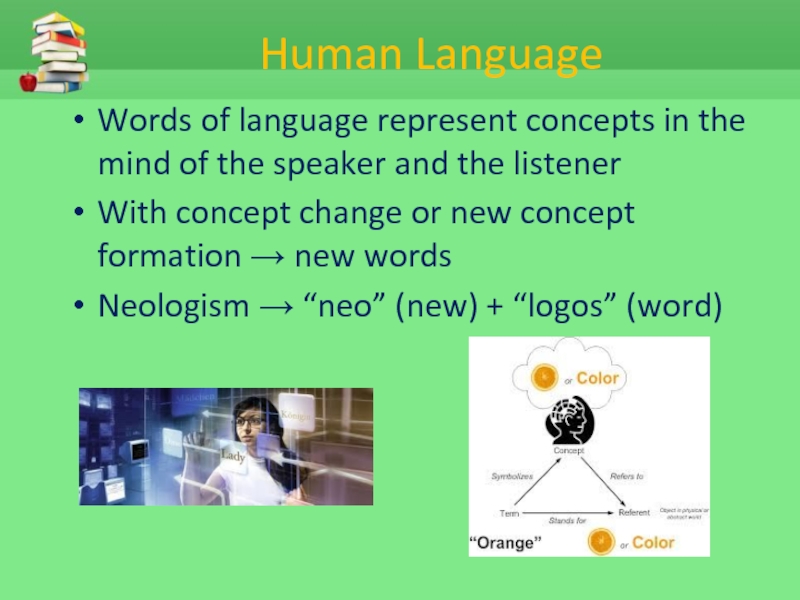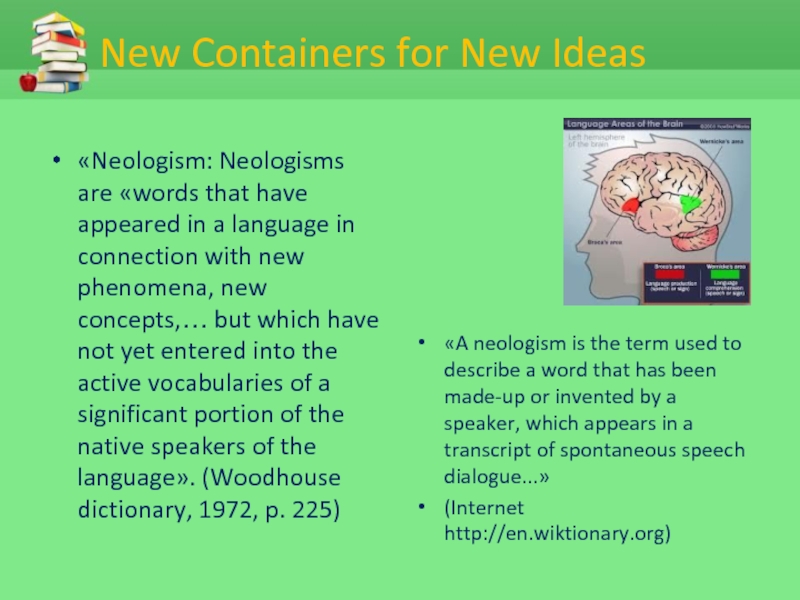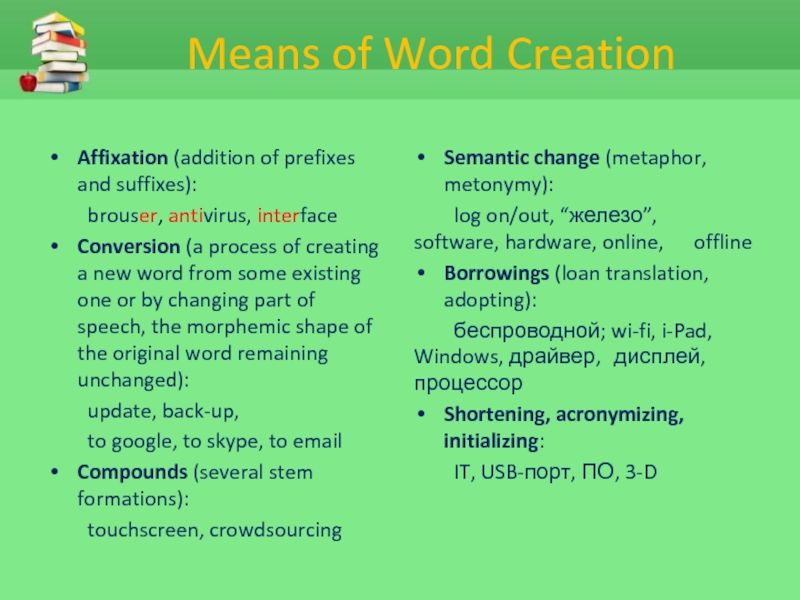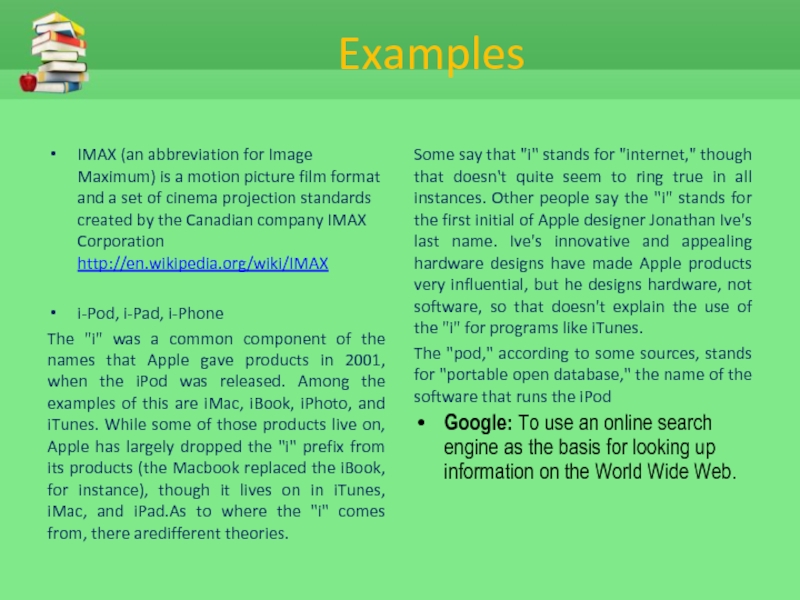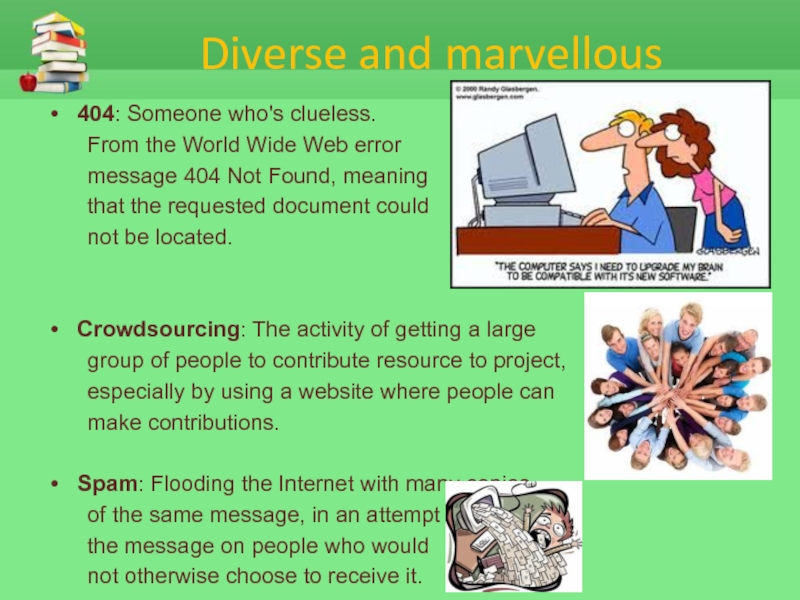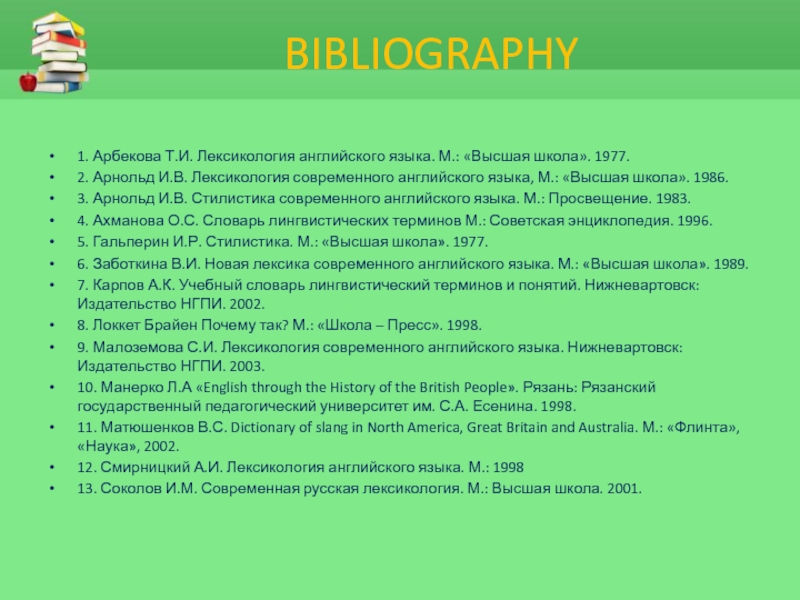- Главная
- Разное
- Дизайн
- Бизнес и предпринимательство
- Аналитика
- Образование
- Развлечения
- Красота и здоровье
- Финансы
- Государство
- Путешествия
- Спорт
- Недвижимость
- Армия
- Графика
- Культурология
- Еда и кулинария
- Лингвистика
- Английский язык
- Астрономия
- Алгебра
- Биология
- География
- Детские презентации
- Информатика
- История
- Литература
- Маркетинг
- Математика
- Медицина
- Менеджмент
- Музыка
- МХК
- Немецкий язык
- ОБЖ
- Обществознание
- Окружающий мир
- Педагогика
- Русский язык
- Технология
- Физика
- Философия
- Химия
- Шаблоны, картинки для презентаций
- Экология
- Экономика
- Юриспруденция
neologism (2) презентация
Содержание
- 1. neologism (2)
- 2. Human Language Words of language represent concepts
- 3. New Containers for New Ideas
- 4. Means of Word Creation Affixation (addition of
- 5. Examples IMAX (an abbreviation for Image Maximum)
- 6. Diverse and marvellous 404: Someone who's clueless.
- 7. BIBLIOGRAPHY 1. Арбекова Т.И. Лексикология английского языка.
Слайд 1NEOLOGISMS
Language is the human capacity for acquiring and using complex systems
Слайд 2Human Language
Words of language represent concepts in the mind of the
With concept change or new concept formation → new words
Neologism → “neo” (new) + “logos” (word)
Слайд 3New Containers for New Ideas
«Neologism: Neologisms are
«A neologism is the term used to describe a word that has been made-up or invented by a speaker, which appears in a transcript of spontaneous speech dialogue...»
(Internet http://en.wiktionary.org)
Слайд 4Means of Word Creation
Affixation (addition of prefixes and suffixes):
brouser, antivirus, interface
Conversion
update, back-up,
to google, to skype, to email
Compounds (several stem formations):
touchscreen, crowdsourcing
Semantic change (metaphor, metonymy):
log on/out, “железо”, software, hardware, online, offline
Borrowings (loan translation, adopting):
беспроводной; wi-fi, i-Pad, Windows, драйвер, дисплей, процессор
Shortening, acronymizing, initializing:
IT, USB-порт, ПО, 3-D
Слайд 5Examples
IMAX (an abbreviation for Image Maximum) is a motion picture film
i-Pod, i-Pad, i-Phone
The "i" was a common component of the names that Apple gave products in 2001, when the iPod was released. Among the examples of this are iMac, iBook, iPhoto, and iTunes. While some of those products live on, Apple has largely dropped the "i" prefix from its products (the Macbook replaced the iBook, for instance), though it lives on in iTunes, iMac, and iPad.As to where the "i" comes from, there aredifferent theories.
Some say that "i" stands for "internet," though that doesn't quite seem to ring true in all instances. Other people say the "i" stands for the first initial of Apple designer Jonathan Ive's last name. Ive's innovative and appealing hardware designs have made Apple products very influential, but he designs hardware, not software, so that doesn't explain the use of the "i" for programs like iTunes.
The "pod," according to some sources, stands for "portable open database," the name of the software that runs the iPod
Google: To use an online search engine as the basis for looking up information on the World Wide Web.
Слайд 6Diverse and marvellous
404: Someone who's clueless.
From the World Wide Web
message 404 Not Found, meaning
that the requested document could
not be located.
Crowdsourcing: The activity of getting a large
group of people to contribute resource to project,
especially by using a website where people can
make contributions.
Spam: Flooding the Internet with many copies
of the same message, in an attempt to force
the message on people who would
not otherwise choose to receive it.
Слайд 7BIBLIOGRAPHY
1. Арбекова Т.И. Лексикология английского языка. М.: «Высшая школа». 1977.
2. Арнольд
3. Арнольд И.В. Стилистика современного английского языка. М.: Просвещение. 1983.
4. Ахманова О.С. Словарь лингвистических терминов М.: Советская энциклопедия. 1996.
5. Гальперин И.Р. Стилистика. М.: «Высшая школа». 1977.
6. Заботкина В.И. Новая лексика современного английского языка. М.: «Высшая школа». 1989.
7. Карпов А.К. Учебный словарь лингвистический терминов и понятий. Нижневартовск: Издательство НГПИ. 2002.
8. Локкет Брайен Почему так? М.: «Школа – Пресс». 1998.
9. Малоземова С.И. Лексикология современного английского языка. Нижневартовск: Издательство НГПИ. 2003.
10. Манерко Л.А «English through the History of the British People». Рязань: Рязанский государственный педагогический университет им. С.А. Есенина. 1998.
11. Матюшенков В.С. Dictionary of slang in North America, Great Britain and Australia. М.: «Флинта», «Наука», 2002.
12. Смирницкий А.И. Лексикология английского языка. М.: 1998
13. Соколов И.М. Современная русская лексикология. М.: Высшая школа. 2001.

